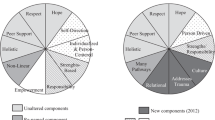Abstract
Black Americans, in contrast to White Americans, use the mental health system in different ways. For example, Blacks tend to terminate treatment earlier than Whites. One explanation for the racial differences is that members of the two groups hold different views about mental health problems and their treatment. To test this explanation, subjects read and responded to questions about vignettes describing individuals encountering personal difficulties that ranged from adjustment challenges to severe psychiatric illness. Black American respondents rated spiritual factors as more important in the etiology and treatment of the difficulties than did Whites. The implications of these findings for theory and practice are discussed.
Similar content being viewed by others
References
Cheung, G.K., & Snowden, L.R. (1990). Community mental health and ethnic minority populations.Community Mental Health Journal, 26, 277–291.
Henderson, G. & Primeaux, M. (1981). The importance of folk medicine. In G. Henderson, & M. Primeaux (Eds.),Transcultural health care (pp. 59–77). Menlo Park, CA: Addison-Wesley Publishing.
Homma-True, R., Greene, B., Lopez, S.R., & Trimble, J.E. (1993). Ethnocultural diversity in clinical psychology.The Clinical Psychologist, 46, 50–63.
Jackson, D.N., & Hayes, D.H. (1993). Multicultural issues in consultation.Journal of Counseling & Development, 72, 144–147.
Levine, M. (1974). Some postulates of community psychology practice. In F. Kaplan & S. Sarason (Eds.).The psychoeducational clinic papers and research studies, Vol. 4 (pp. 209–224). Boston: Massachusetts Department of Mental Health Monographs.
Lopez, S.R. (1989). Patient variable biases in clinical judgment: Conceptual overview and methodological considerations.Psychological Bulletin, 106, 184–203.
Mollica, R.F., Streets, F.J., Boscarino, J., & Redlich, F.C. (1986). A community study of formal pastoral counseling activities of the clergy.American Journal of Psychiatry, 143, 323–328.
Myers, L.J. (1988).Understanding an Afrocentric world view: Introduction to an optimal psychology. Dubuque, IA: Kendall/Hunt.
Neighbors, N.W., & Lumpkin, S. (1990). The epidemiology of mental disorders in the black population. In D. Ruiz (Ed.),Handbook of mental health and mental disorder among black Americans (pp. 55–70). New York: Greenwood Press.
Raskin, A., Crook, T.H., & Herman, K.D. (1975). Psychiatric history and symptom differences in black and white depressed inpatients.Journal of Consulting and Clinical Psychology, 43, 73–80.
Schwebel, A.I., & Fine, M.A. (1994).Understanding and helping families: A cognitive behavioral approach. Hillsdale, NJ: LEA Press.
Serafica, F., Schwebel, A.I., Russell, R., Isaac, P., & James-Myers, L. (1990).Mental Health of Ethnic Minorities. New York: Praeger Press.
Snow, L.F. (1983). Traditional health beliefs and practices among lower class Black Americans.The Western Journal of Medicine, 139, 820–828.
Sue, S. (1977). Community mental health services to minority groups: Some optimism, some pessimism.American Psychologist, 32, 616–624.
Sue, S., McKinney, H., Allen, D. & Hall, J. (1974). Delivery of community mental health services to black and white clients.Journal of Consulting and Clinical Psychology, 42, 794–801.
Sue, S., & Zane, N. (1987). The role of culture and cultural techniques in psychotherapy: A critique and reformulation.American Psychologist, 42, 37–45.
Sussman, L.K., Robins, L.N., & Earls, F. (1987). Treatment-seeking for depression by blacks and white Americans.Social Science and Medicine, 24, 187–196.
Terrel, F., & Terrel, S. (1984). Race of counselor, client sex, cultural mistrust level, and premature termination from counseling among black clients.Journal of Counseling Psychology, 31, 371–375.
U.S. Bureau of the Census (1993).Population profile of the United States: 1993 (Current Population Reports, Series P23-185). Washington, DC: U.S. Government Printing Office.
Author information
Authors and Affiliations
Additional information
Peter E. Millet, Ph.D., is affiliated with the Dept. of Psychology, Connecticut College, New London, CT. Bryce F. Sullivan, M.A., and Andrew I. Schwebel, Ph.D., are affiliated with the Dept. of Psychology, The Ohio State University. Linda J. Myers, Ph.D., is affiliated with the Dept. of Black Studies, The Ohio State University.
Rights and permissions
About this article
Cite this article
Millet, P.E., Sullivan, B.F., Schwebel, A.I. et al. Black Americans' and White Americans' views of the etiology and treatment of mental health problems. Community Ment Health J 32, 235–242 (1996). https://doi.org/10.1007/BF02249425
Issue Date:
DOI: https://doi.org/10.1007/BF02249425




